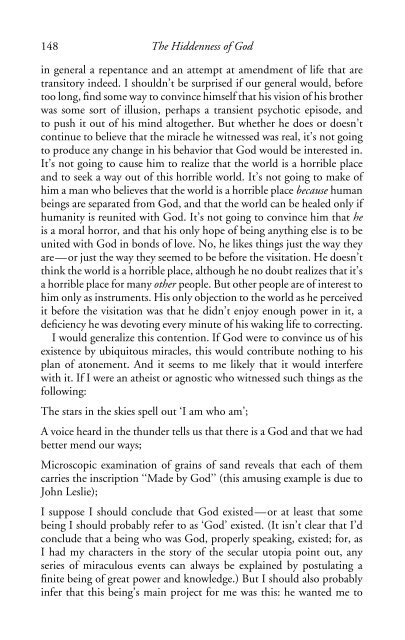The Problem of Evil - Common Sense Atheism
The Problem of Evil - Common Sense Atheism
The Problem of Evil - Common Sense Atheism
You also want an ePaper? Increase the reach of your titles
YUMPU automatically turns print PDFs into web optimized ePapers that Google loves.
148 <strong>The</strong> Hiddenness <strong>of</strong> God<br />
in general a repentance and an attempt at amendment <strong>of</strong> life that are<br />
transitory indeed. I shouldn’t be surprised if our general would, before<br />
too long, find some way to convince himself that his vision <strong>of</strong> his brother<br />
was some sort <strong>of</strong> illusion, perhaps a transient psychotic episode, and<br />
to push it out <strong>of</strong> his mind altogether. But whether he does or doesn’t<br />
continue to believe that the miracle he witnessed was real, it’s not going<br />
to produce any change in his behavior that God would be interested in.<br />
It’s not going to cause him to realize that the world is a horrible place<br />
and to seek a way out <strong>of</strong> this horrible world. It’s not going to make <strong>of</strong><br />
him a man who believes that the world is a horrible place because human<br />
beings are separated from God, and that the world can be healed only if<br />
humanity is reunited with God. It’s not going to convince him that he<br />
is a moral horror, and that his only hope <strong>of</strong> being anything else is to be<br />
united with God in bonds <strong>of</strong> love. No, he likes things just the way they<br />
are—or just the way they seemed to be before the visitation. He doesn’t<br />
think the world is a horrible place, although he no doubt realizes that it’s<br />
a horrible place for many other people. But other people are <strong>of</strong> interest to<br />
him only as instruments. His only objection to the world as he perceived<br />
it before the visitation was that he didn’t enjoy enough power in it, a<br />
deficiency he was devoting every minute <strong>of</strong> his waking life to correcting.<br />
I would generalize this contention. If God were to convince us <strong>of</strong> his<br />
existence by ubiquitous miracles, this would contribute nothing to his<br />
plan <strong>of</strong> atonement. And it seems to me likely that it would interfere<br />
with it. If I were an atheist or agnostic who witnessed such things as the<br />
following:<br />
<strong>The</strong> stars in the skies spell out ‘I am who am’;<br />
A voice heard in the thunder tells us that there is a God and that we had<br />
better mend our ways;<br />
Microscopic examination <strong>of</strong> grains <strong>of</strong> sand reveals that each <strong>of</strong> them<br />
carries the inscription ‘‘Made by God’’ (this amusing example is due to<br />
John Leslie);<br />
I suppose I should conclude that God existed—or at least that some<br />
being I should probably refer to as ‘God’ existed. (It isn’t clear that I’d<br />
conclude that a being who was God, properly speaking, existed; for, as<br />
I had my characters in the story <strong>of</strong> the secular utopia point out, any<br />
series <strong>of</strong> miraculous events can always be explained by postulating a<br />
finite being <strong>of</strong> great power and knowledge.) But I should also probably<br />
infer that this being’s main project for me was this: he wanted me to
















